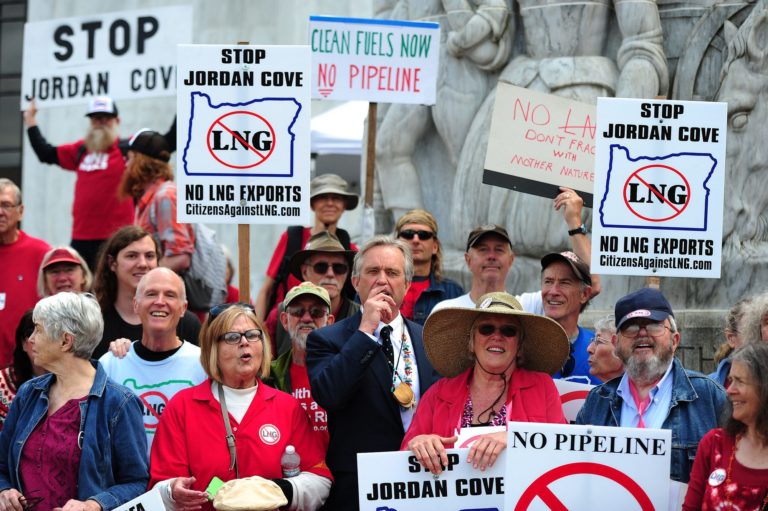Tribes, Landowners and Conservation Groups Intervene in Jordan Cove Pipeline Fight
By: Waterkeeper Alliance

Last month, Pembina, the Canadian Company behind the Pacific Connector Gas Pipeline and LNG export terminal filed their Certificate Application with the federal government, marking their third attempt over a 12 year period to build a pipeline through southern Oregon to ship fracked gas overseas.
The project has faced stiff opposition from impacted communities because it would trample private property rights, disturb tribal territories and burial grounds, threaten 400 rivers and streams, and create one of the largest sources of climate pollution in the state.
In 2016, under the Obama administration, the Federal Energy Regulatory Commission (FERC) denied the proposal for the fracked gas pipeline and LNG export terminal saying the project was not in the public interest. But Pembina is hoping that they might have different luck under the Trump administration. The company is counting on the new administration to push federal agencies, like FERC, and Oregon state agencies to allow this pipeline project to go through.
Impacted parties and concerned community members have signed up as Intervenors to voice their opposition to the project and so that they will have legal standing in court if the project is approved. Only impacted parties who filed as intervenors will be able to participate in future legal challenges to FERC’s decision whether to grant permits and authorize eminent domain, for example.
Those who filed motions with FERC intervened based on a number of issues including direct impacts to private property, businesses, and indigenous territories. Keri Wu, an adjacent landowner in Trail, Oregon lodged the following concerns in her motion with FERC: “I own 10-acres within a quarter-mile of the proposed Pacific Connector Pipeline and have personal concerns about the safety of this project. I am concerned with gas leaks and fires. I have already evacuated my home once during the Cleveland Ridge fire in August of 2016 and I am concerned with the added safety implications of a natural gas pipeline in a tinder-dry forest and an identified earthquake zone.”
Indigenous tribes also intervened in order to protect traditional territory and waterways. Among them are the Klamath, Yurok, and Karuk Tribes which have all come out in strong opposition to the pipeline project.
Intervenors hope that filing with FERC will increase transparency and access to the public in the federal process. “We can’t count on FERC to provide an adequate review of the harmful impacts to clean water and our communities,” said Stacey Detwiler of Rogue Riverkeeper. “We need our state agencies and elected representatives to take a leadership role in upholding state environmental laws and stop this project once and for all.”
This November, Governor Kate Brown will join world leaders at the United Nations Climate Talks in Germany. “We are looking to Governor Brown to stick to her commitment to protect our climate,” said Allie Rosenbluth of Rogue Climate. “Whether or not Governor Brown stands up to Jordan Cove, the largest fossil fuel project our state has ever seen, will determine if she truly is a climate champion. Our state should be focused on creating good-paying jobs in improving energy efficiency and the expanding clean energy industry, not on new fossil fuel projects that hurt us all.”
*Photo by Alex Milan Tracy/Sipa USA